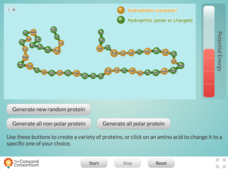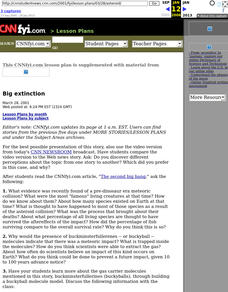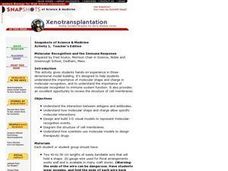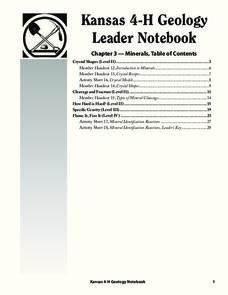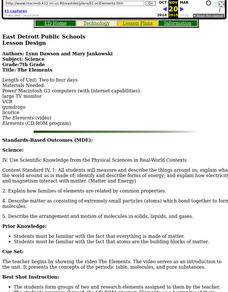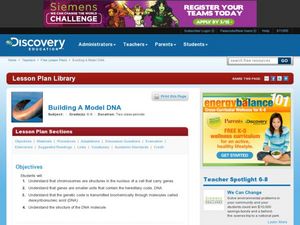Concord Consortium
Protein Folding Exploring
The potential energy of peptides varies over time as they fold. An exploratory simulation encourages pupils to play with various strands of amino acids to observe the folding and potential energy levels. Young scientists generate all...
Curated OER
Big Extinction
High schoolers discuss evidence of a pre-dinosaur era meteoric collision, and its impact on living creatures. They build buckyball molecule models out of marshmallows, toothpicks, and soccer balls.
Exploratorium
Indicating Electrolysis
Sure, your learners know water is made up of two molecules, but watching them separate helps the class see the construction like never before. This resource provides directions on how to build a simple electrolysis device using a...
Learning Games Lab
Nitrogen in Pollutants
Responsible farming is important for maintaining natural resources. Eager scientists complete a WebQuest to explore what happens to nitrogen when it enters the soil. They learn about the chemical makeup of nitrogen-based molecules...
Curated OER
Molecular Modeling
Students recognize that the fundamental building block of all organic and inorganic matter is the atom. They construct models of a sugar, fatty acid, amino acid and nucleic acid and describe their roles.
Curated OER
DNA Models
Students construct paper model of the DNA molecule. In this genetics lesson, students assemble paper parts that represent nucleotides into a DNA molecule. Extension ideas are also provided.
Curated OER
Carbon Creating Activity
In this carbon worksheet, students follow directions and use marshmallows and toothpicks to made carbon dioxide and glucose molecules. Students do this to see how carbon changes as a result of photosynthesis.
Science-Class.net
Rock Candy Crystals
Candy is one of my favorite words, and it's an even better word when it relates to science. Yes, candy science can happen when you grow rock candy crystals with your class. The entire process for growing these edible wonders of nature is...
Curated OER
DESKTOP ELECTROPHORESIS LAB - MOVING MOLECULES
Young scholars build efficient electrophoresis systems for less than $15.00 each and use them to demonstrate electrophoresis ability of stain molecules and materials such as DNA.. They know that electrophoresis is a technique used for...
Curated OER
Molecular Models
In this molecules worksheet, students use a molecular model kit to build a molecule, draw a 3-D structure and describe its shape. This worksheet has 2 graphic organizers.
Curated OER
Build Your Own Atom
Young scholars build a model of an atom using an online program. In this chemistry lesson, students discuss the different parts of the atom. They complete an independent research about their chosen element.
Curated OER
Molecular Recognition and the Immune Response
Learners explore the importance of molecular shape and charge in molecular-recognition. They examine the interaction between antigens and antibodies. Students design and build 3-D visual models to represent molecular-recognition...
Steinhardt Apps
Kinetic Molecular Theory
Building off young chemists' knowledge of the states of matter, kinetic molecular theory is the focus of the unit. Eight days of lessons including multiple demonstrations, one lab experiment, directed instruction, and worksheets,...
Curated OER
Molecular Structures or Visualizing Molecules
Young scholars identify and describe the molecular structure using the terms of Valance Shell Electron Pair Repulsion. Students predict simply molecular structure in various forms, as well as predict bond structure between atoms of a...
K-State Research and Extensions
Crystal Shapes
Of quartz I love geology! The chapter offers five activities at three different levels. It features hands-on activities that cover crystal shapes, cleavage and fracture, hardness scale, specific gravity, and mineral...
Curated OER
Models of Hydrocarbons
Students construct models of hydrocarbon molecules using candy and toothpicks. In this hydrocarbons lesson plan, students are given a sheet with the molecular formulas of hydrocarbons. As a group, they construct each molecule using...
Towson University
Berries...With a Side of DNA?
Sometimes science lab can be ... delicious! Middle school science scholars extract DNA from strawberries and other fruits in an engaging lab activity. The teacher's guide includes pacing, materials list, and worksheets with answer keys.
Curated OER
The Elements
Students watch video, The Elements, research information about elements using both the Internet and CD-ROM program, and create atoms out of gumdrops and licorice.
Curated OER
Building a Model DNA
Students explain the function of DNA in the body. In this biology lesson plan, students build a DNA model using simple materials. They demonstrate how bases pair up in the helix.
Biology Junction
Macromolecules
In chemistry, organic means something contains a carbon base. A helpful presentation starts by defining macromolecules as large organic carbon molecules. Scholars answer questions about each topic on the associated worksheet. It covers...
American Chemical Society
Does Temperature Affect Dissolving?
When making sweet tea, why do people dissolve the sugar in hot tea instead of cold tea? The class discusses the previous lab and builds upon it. Working in groups, they design an experiment to determine how temperature affects the...
Serendip
Using Models to Understand Cellular Respiration
Energize biologists with colorful images in an activity that captivates the imagination while demystifying the subject of cellular respiration. Participants build comprehension skills and access core content knowledge by analyzing text...
Curated OER
States of Matter Lesson
Second graders identify the three phases of matter and demonstrate how a property can change states of matter. In this states of matter lesson, 2nd graders make an Ooze to discover how a solid changes into a liquid. Students...
LABScI
Atomic Structure and the Periodic Table of Elements: The Secret Agent Lab
Food always gets attention! Model atomic structure using fruit loops to represent the subatomic particles. After building models, scholars create ionic bonds using their models. Finally, they use these concepts to create a periodic...


